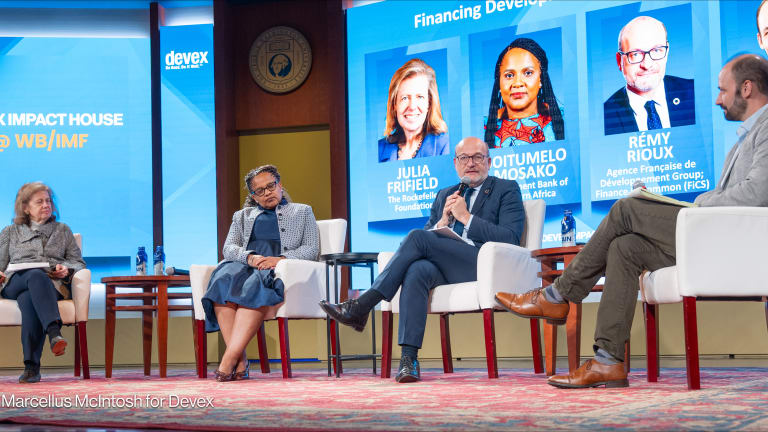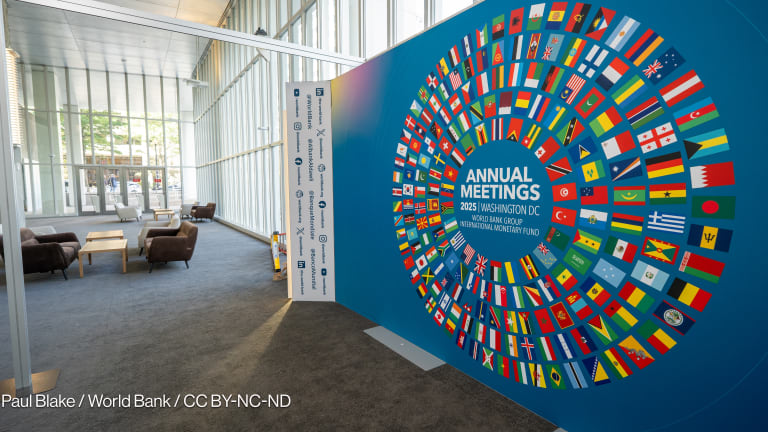
PARIS — Europe should reject the logic behind the United States’ “perverse” new aid strategy, the head of the French Development Agency, or AFD, has told Devex, arguing that Washington’s focus on countries’ “self-reliance” reflects one of two competing visions on the future of development cooperation.
“For a developing country, this call to self-reliance has some power. But if it means stopping international finance, I think it’s a problem.”
— Rémy Rioux, director-general, AFDThe USAID policy, launched earlier this year, declares it is “built around the compelling yet simple notion that the purpose of our assistance must ultimately be ending the need for it to exist.”
Yet for Rémy Rioux, director-general at AFD, this reflects an outdated model of development.
“It’s the logic of ‘catching up’: That is, one day these countries will be like the United States and they’ll get by by themselves,” Rioux told Devex last week in his office in Paris.
“Today, in the real world, it’s a narrative that bothers me. Because to allocate development finance according to the capacity of a country to overcome [the need] for development finance is a little perverse, in fact. It’s a way of legitimizing a narrative of pulling back.”
“I think the opposite. [Solving] most big international problems relies on international cooperation and [these] won’t be solved in individual countries.”
Q&A: Why 'self-reliance' is the wrong goal for US aid
Not everyone is on board with USAID's "journey to self-reliance." Devex speaks to Georgetown University's Matthew Kavanagh about why it's the wrong message for the moment.
Rioux is not the first to take issue with the strategy. Last month, Matthew Kavanagh, a professor at Georgetown University, told Devex that “middle-income countries may reach a certain threshold of income but that can often mask the continuation of important vulnerabilities.”
Rioux shares that view, arguing that rather than halting aid altogether as a country grows richer, donors should alter their instruments — using fewer grants and more loans, for example, or offering scholarships in order to maintain ties.
“[USAID] evaluate the capacity of each country to be self-reliant. In Europe, I don’t believe that can be our doctrine,” Rioux said. “I think for a developing country, this call to self-reliance has some power. But if it means stopping international finance, I think it’s a problem.”
He added: “If we allocate aid on the basis of self-reliance, we risk forgetting the countries which are the furthest from being self-reliant: the poorest, most fragile countries.”
Rioux spoke to Devex upon the release of his book, “Réconciliations,” which covers the major topics in development today, such as migration, relations with Africa, and the role of China.
Rioux argues that not only is official development assistance insufficient to meet the goals set in 2015 through the Addis Ababa Action Agenda on financing for development, the Sustainable Development Goals, and the Paris Agreement on climate change, but that for now, most global investment runs contrary to the SDGs.
When it comes to measuring how much money goes toward meeting the goals, Rioux writes that emerging countries in the global south “will no doubt never accept the reporting and accounting requirements established without them by the Organisation for Economic Cooperation and Development.”
Instead, he proposes a new concept — “sustainable development investment” — to complement traditional ODA, but which would encompass all countries and all financial actors, including “development institutions, public and private banks, investment funds, businesses and foundations.”
Last week at a meeting in Paris, G-7 development ministers committed to greater transparency on spending toward sustainable development and highlighted OECD’s work on measuring total official support for sustainable development.
However, OECD said it would not take this as a prompt to reopen negotiations — which ended without a final agreement last year — on how its members’ use of private sector instruments, such as budget guarantees, should be counted in their aid statistics.
“One way or another, we’ll get there,” Rioux said. “If it’s not the OECD, it must be the United Nations that does it. Someone needs to do it.”
“Réconciliations” will be available in English in September.








